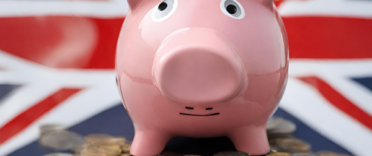Episode 353 - On this week's podcast Andy talks about Iceland's ethical loans, launched by not-for-profit lender Fair for you, in a bid to help fight food poverty. Next, I explain the importance of diversification after an 80-20 member got in touch to ask why people include low-risk investments in their portfolio. I also provide some tips on budgeting, answering a number of questions from readers and listeners who are following the Money to the Masses 28 day financial fitness challenge.
Join the MTTM Community group, a friendly community that allows like-minded listeners to ask questions and chat.
You can also listen to other episodes and subscribe to the show by searching 'Money to the Masses' on Spotify or by using the following links:
Abridged transcript - Episode 353
We start the show by discussing our article Iceland offering “ethical” loans up to £75 to cover food costs: How does it work?
Damien Fahy 11:27
Damien then discusses his latest research highlighting why you should diversify, which refers to this Asset performance heatmap
Budegeting
Damien Fahy 33:38
I'm going to run through lots of questions that people have asked about budgeting following our 28 Day Financial Fitness Challenge.
You can start it whenever you want to and it will get your finances into shape over a 28 day period of very small, easy to do tasks every day and we provide lots of resources that help you with that. As part of it, you'll build your own budgets and you’ll build your own black book which contains the information about your finances.
Free budgeting spreadsheet
"So this week, we helped people to start to build a budget and we created a budgeting spFreadsheet which you can download for free, which is based upon a spreadsheet that I use personally. If you want to go and find that then you can go to it directly or via those pages on the website which are related to the 28 Day Challenge. The URL if you want to go to it directly is moneytothemasses.com/free-budget-planner. Here’s a link to a video that explains how the free budgeting spreadsheet works and how to use it.
Essentially it helps you to quantify and control your spending and be able to start to build a budget. It puts things into needs, wants and savings/clearing debt/investing. You’d ideally be hoping to allocate more and more to clearing your debt and investing for your future portion. People have started to build their budgets and we're going to help them next week when the challenge continues".
Budgeting tips
"We’ve had some questions and I'm going to run through these. If you have any questions, send them in as we'll do another update to this in the future. We can also answer them in the Facebook community if you put them in there".
Q. “I'm apprehensive about using budgeting apps. Are they safe?”
"Now the reason that was asked was because I recommend that people use some of the budgeting apps. Money Dashboard and Emma are two of the most well-known ones and they are probably my two current favourites. I use them both but Money Dashboard is probably my preferred option as I use that way more because it has a huge amount of features that are all free and you can tinker with it to fit your own circumstances a bit better. They work with open banking and they have to adhere to certain strict security guidelines. They only ever get read-only access to your credit cards or bank accounts and they collate all the information from those bank accounts and credit cards, and put it into one place. They have very clever algorithms in the background which analyze your spending so you don't have to go through your old statements and work out how much you spend a month on food as it will work it out for you in an instant. Don't forget there are thousands of people using these apps and their algorithms recognize the different retailers etc. and categorise your spending, e.g. groceries. You can create your own rules so you can change it and make it more bespoke to your own spending plans. It allows you to see how much you truly do spend on food a month, for example. It will analyze your spending, not just from today forward, but it will go back to the last 12 months and tell you what you've been spending your money on. So if you can quantify it, you can control it".
Q. Should I use a budgeting app rather than a spreadsheet?
"I use both because the budgeting app is very useful for providing information, analyzing your spending across multiple credit cards, across multiple bank accounts and by collating that down it takes out the pain of trying to work out where your money's going. You can take that data and put that into your spreadsheet, which can then analyze where your money's going in terms of percentage-wise, and then look at how you can cut back. Then you can set a budget, which you can input into the budgeting apps and the apps will send you alerts if you're starting to break that budget. But you're also always using them in tandem. The budgeting apps are a way of monitoring what's going on live as we go along without having to do any analysis. Every time I spend something in the shops, it drops into those budgeting apps, and it then knocks it off of my budget. I can then look straight away and see what I have left in each of my budget pots. The more budgets you have, the better, so you could have one for maybe the petrol you spend in a month, your food bills, clothing maybe".
Q. What percentage of your income should be put into savings?
"This is personal to you. One school of thought is the 50/30/20 principle where 50% of any of your net pay should go into your needs, 30% into your wants and 20% into your savings or investments or clearing debt. It's a bit idealistic and I don't adhere to that because I think the world's moved on. Look at our energy bills for example, they're way more than they used to be of our spending. I think the main thing is just to know what you're spending in each area, try to cut back on your needs, try to eliminate as much of your unnecessary discretionary spend, and start trying to move more money to clear debt, and save for your future and investing for your future".
Q. Are there any tips for being able to be more successful?
"One tip I would say is create the buffer. So make sure when you create a budget, really know exactly what your average spend is each month and decide to stick to it. You should always give yourself a buffer, maybe round up to the nearest £10 so each budget has a little buffer just in case you go over, because there are always unforeseen circumstances and that way you won't become deflated. You're more likely to meet your budget and if you have anything left over at the end of the month, you can sweep that across to pay off debt or put into savings or investments".
Q. What is the best way for me to clear debt while still budgeting for my essential bills?
"Your debts, such as your minimum payments on your credit card, will be one of your essential bills otherwise you will default, and then you'll end up impacting your credit rating. So they will be in your ‘need’ section, your central section as well but you want to try and pay over those minimums each month. The best way to do that is to cut back on unnecessary spending or increase your income. We did a piece on Instagram about trying to get a pay rise and we’ve also talked about it on podcasts in the past. Go and search for them. Any savings that you make on bills or spending, put that on your budget to overpay your debts or save and invest, so increase that budget for that particular section".
Q. Is it worth paying the extra for the additional features on a budgeting app?
"Personally, I don't think it is. I've not come across one that has features that are worth paying for. Money Dashboard gives a lot of them for free so I don't know why you would want to pay, but if you want to and it helps, then that's your call".
Q. How do I change or manage my budget in the run-up to Christmas or other expensive periods?
"You need to budget for those things for the whole year. Now, I know that I have certain bills in a given year, a lot of them are related to my children to do certain classes that might come out every now and then and I budget assuming that it's an annual bill. So I multiply up how much I have to pay at each given point in the year to work out the annual amount I have to pay and then divide it by 12 to work out the monthly amount. Then I start to budget and save money aside so when I get to the point that I've got to pay the next instalment of that bill, I've already got the money in a savings account, so it doesn't impact my wider budget. I'm already budgeting each month. Of course, the other thing you can always do is the roundups which a lot of banking apps and budgeting apps e.g. moneybox, allow you to do. So when you spend on your debit or credit card that you've linked up, it will then round that money up to the nearest pound and the difference gets put into a savings account. That's a good way of saving money over a period of time and have the money as a budget for Christmas. I do it. You can even double the pace of those round-ups if you want".
What is the best time of year to start budgeting?
"There isn't a best time. I think you just need to start budgeting now".
Can I involve my children in budgeting to improve their understanding of personal finance?
"That's down to you, I try to talk to my children about budgeting but that's normally because it becomes a conversation that has to be had when they want something and I tell them that we can't afford to buy it this month, but everyone's different.
There are some great techniques where you can start to teach your children about saving and budgeting. It's the three envelope approach where you get your children to put their pocket money and separate into one of three envelopes, one for almost immediate short term spending, one for medium term goals and one for long term goals. So they may have some money and they allocate some of it to spend at the shop today, some of it aside for something they’re saving towards in the next couple of months and then something that might be much longer term, maybe for spending on a holiday in the next couple of years. This helps them to realise that you need to budget and you build budgets that way, yet they don't have to be a complete sacrifice, they can spend money out of that short term budget they've allocated".
I have payments and subscriptions that I'm not sure what they are, but I’m afraid to cancel them. Is there an easy way to find out?
"One way is to contact your bank and try to find out any information that you can, but normally, the direct debits give you enough information so you can work out who the company is, and then ring them up and find out what the service is that you're paying for and how to cancel it. Next week on the 28 day challenge, you'll have your budgets, you’ll have quantified your spending and you’ll look at your direct debits or standing orders and try to start to cancel ones that aren't needed. However, be careful of just cancelling things, because you need to know what they are, because it could be something that you've signed up to that could be something like a direct debit for a debt, that you've got that you’re repaying and you could end up defaulting if you cancel it. So you should always find out what the service is that you're paying for first and how to cancel it properly. And then ultimately, you do need to cancel your direct debit. If there's a service and you end up getting a refund, they might refund you via that direct debit rather than pay you money out and that happens a lot with energy companies"
How does an emergency fund factor in when budgeting?
"You simply need to start building one so it becomes one of your ‘pay yourself first’, one of your standing orders that’s part of that saving/repaying debt/investing section of your budget, so that you're starting to build up that buffer. 3-6 months’ earnings is typical or 3-6 months’ expenses is another option. The more money you can do, the better. People would have found the pandemic quite difficult on just 3-6 months’ savings and so there is one school of thought that maybe we should start pushing it to 12 months".
I've got a bit of money left over at the end of each month, and I want to invest it. Is it worth it, or should I leave it as accessible income?
"Now, again, always make sure you've got accessible income before you start investing, because it can be difficult to get the money out of an investment depending on what it is. And also it might force you to crystallize a loss if you have to access it. So build yourself that cash buffer that I mentioned and then, of course, start to invest. There are places that you can invest e.g. look at the best investing apps. On our website, there's an article that explains places that you can start to invest with as little as a pound and also look at our best stocks and shares ISA article. So there are plenty of places where you can invest without having to do much work. You can end up having the portfolio run for you with as little as a pound. So the most important thing is to start, and over time you’ll start to increase the amount you're putting away. That's how you build wealth for the future. As a first step you could put in £2 a week or £5 a month and start to increase that over time".
I get paid weekly so find budgeting difficult as my bills are monthly. Any tips?
"You need to multiply up your earnings, work with whatever your pay period is as you don't have to work on monthly - you can work on weekly or two weekly budgets, but the point is that they have to be consistent. So if you have a bill that comes out once a month, and you get paid twice in that period, then in each of those pay packets, you need to budget half of that bill. It's just being sensible, working out how frequent your bills are, and making sure you're budgeting ahead of their payment by working out how many pay packets that you have before the bill comes and simply dividing it down. If you have earnings that fluctuate quite a bit it can be hard, and in that instance it’s best to veer towards the low end, so budget based on the weakest months. That way, if you have a period of time where you don't earn as much as you thought you would, then you won't have to panic. I'd also put aside more money in the months where I was earning more. It's about managing that process. Anybody who's been self-employed or a freelancer for a period of time, will know what that's like.
Also, if you are earning money that you need to pay tax on subsequently, so it's not through PAYE, that needs to be put aside into a savings account straightaway. There are tax calculators that you can use and there are some on the HMRC website. They can tell you the amount of tax that you need to be putting aside from any payments that you receive; put that straight into a bank account and label it ‘tax’ (if you’re using a budgeting app) and you're working out an over-budget for that, and put it aside. That way you're working your own personal budgets off your net pay. So when your tax bill comes on 31st of January, you're just taking the money out of the savings account to pay whatever you've calculated, or your accountant has told you to pay. So again, it's a form of budgeting".
Resources:
- Asset performance heatmap
- 28 Day Financial Fitness Challenge - Week 1
- 28 Day Financial Fitness Challenge - Week 2
- 28 Day Financial Fitness Challenge - Week 3
- Budgeting for beginners video
- Free budget planner



